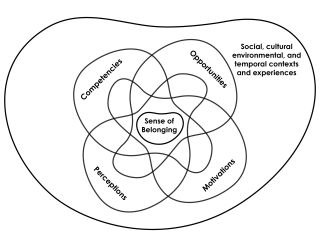Parenting
Planting the Seeds of Belonging for Parents
Exploring the integral role of parents in educational ecosystems.
Updated June 23, 2023 Reviewed by Davia Sills
Key points
- Engaging parents and creating social opportunities within schools may positively influence student outcomes.
- Schools can proactively create opportunities for parent engagement, considering individual needs and access.
- Schools need to communicate the value of parental involvement and appreciate their contributions.
- Schools should aim to foster a genuine desire among parents to be part of the school community.
As I reflect on the concept of belonging and its pivotal role in educational contexts, particularly for teachers (Longmuir et al., 2022) and students (Allen et al., 2018), I am reminded of the many botanical metaphors often used to describe it, along with other significant student factors, like well-being. So, bear with me as I explore yet another one.
A school is akin to a garden, where each stakeholder—school staff, students, and parents—is a unique plant requiring different conditions (in the way of nutrients) to thrive. Educators often spend considerable time and effort understanding and catering to the needs of students, the plants they see before them daily. However, this is sometimes done at the expense of their own needs, resulting in the emergence of evidence that teachers are a profession vulnerable to reduced well-being, stress, burnout, and a desire to leave (Longmuir et al., 2022).
Yet, even more overlooked are parents. In the school system, parents often remain unseen, much like plant roots. The fact that they experience mental health challenges proportionate to the general population can go unconsidered when we consider student well-being (Reupert & Mayberry, 2016). Yet, parents are just as crucial in contributing to the school climate, culture, and community. Despite this, their own sense of belonging to the school community and its potential implications for attendance, retention, and educational outcomes is also neglected in research.
When we examine the general adult population’s loneliness prevalence rates, we find adults, especially those with caregiving responsibilities, experience social isolation (Pruett, 2019). Now consider the places where these parents have an opportunity to interact with other adults more than any other social environment—schools. Being part of a parent body may offer a prime opportunity for connection.
The Integrated Belonging Framework (Allen et al., 2021) (Figure 1) emphasizes such opportunities for belonging as well as associated competencies, perceptions, and motivations, providing a practical lens through which we can better understand parent belonging in schools. Through this lens, we can begin to ask: How can we, as a school community, create an enriched environment that empowers parents to participate in their children’s educational journey? To show up at school-based events, parent information evenings, parent-teacher interviews, and take an interest in their children’s educational outcomes—perhaps even read a newsletter?

Opportunities
First, let’s consider opportunities. Schools form a natural microsystem—a small, interconnected network within a larger community—and often within a school, smaller groups can emerge: parent committees, sporting club groups, Facebook parenting groups, pick-up conversations, and even informal groups around school pick-up and drop off—these groups become places where parents can engage. However, these opportunities often arise incidentally rather than deliberately. By making a concerted effort to create opportunities and comfortable spaces for parents to connect, such as through parent-teacher associations, online discussion groups, and school events—and helping to ensure parents are aware of these groups—schools can begin to enhance parent belonging.

Tanya Brohier Bondin, the parent of children ages 10, 7, and 6 (Jhett, Shanaya, and Aaliyah), reflects on how her parental involvement at her children’s school impacts her children’s sense of belonging. She says:
“My children are my greatest blessing and achievement. The day they started school was daunting as a mum, filled with so many thoughts and feelings, but I had to trust that I had made the right choice in school. Would they belong? Belonging is a big word for a child. For me, it was about giving them a sense of comfort, a place of safety where they knew they were meant to be, they were included, and they were loved away from home.
“To help them belong as a mom, I make sure they participate in every school activity and show up ready to engage. Book week is one of our biggest family events; the kids love getting involved, and they are comfortable showing their individual character and personality, which to me indicates that they feel they belong to an environment where they are accepted.”
Competencies
Belonging competencies may seem like something we would expect parents to have already established. However, this is not always the case. Just like the broader population, parents can feel shy, awkward, or uncomfortable initiating or connecting.
Parenting skills, in their own right, form a competency that schools can support. Building positive relationships, engaging in academics, and strength-based parenting—schools can support parents by offering information evenings or seminars on these topics. They can also provide resources to help parents understand the school’s expectations and processes—what they can expect regarding communication, how they can get involved proactively, and how they can navigate online systems. Importantly, this support should be accessible and tailored to meet each parent’s unique needs and constraints, considering factors such as languages spoken, work schedules, and digital literacy. Because when challenges arise, it’s reasonable to imagine parents questioning if this is a school they should belong to.
Perceptions
Third, perceptions play a critical role in parent belonging. Parents may have preconceived notions about their role in the school community based on past experiences. Schools can work to shift these perceptions by consistently communicating the value and importance of parent involvement and demonstrating openness to parental input and collaboration.
One mother reflects:
“For me, I didn’t feel connected at all in the first year my kids attended school, and that was to do with me. I’m an older mum than the rest of the mums in my kiddies' years, and I never really felt connected to my community because I moved here from interstate and felt it was a different culture and I didn’t fit in. But I’m very happy with my own company and prefer the company of older people or people who are more insightful, at least. So for the first year, I made incorrect first impressions about people, and with the pandemic, there was never really a chance to get to know others very well, and quite frankly, I wasn’t very keen.
"This year, however, birthday parties have started, and we have all gotten to know each other better. I have definitely met people more like me than I had anticipated. All parents pick up from the gate, so we all hang around under the trees, waiting and saying hi. Probably the biggest thing for me was having my child’s birthday party, where we invited everyone, and that made a difference as I was then communicating with all parents. Our school is small, and there is an opportunity for connection. At other local schools, there are fewer opportunities. There is no 'gate' to all hang around and chat as it is all a car pick-up kind of system, so there is almost no interaction between parents and apparently very little with the school, too, so I guess each school is different.”
Motivation
Finally, motivation is an important consideration of parent belonging. Parents must feel a genuine desire to belong and be involved. This desire can be nurtured by making parents feel valued and heard, by showing appreciation for their contributions, and by communicating the positive impact their involvement has on their children’s educational outcomes. Schools can recognize that belonging is a fundamental need and that while parents’ needs to belong may vary, fostering their sense of belonging within the school community may have important outcomes for students and the school climate.
Final Thoughts
Research shows how parent participation can enrich the school community (Bradley et al., 2021; Haugan et al., 2019; Zaff et al., 2017). While educational research has made progress in recognizing the importance of teacher and student belonging, it’s high time we turned our attention to parent belonging. Like the roots in our metaphorical garden, parents provide essential support and nourishment. By leveraging opportunities, competencies, perceptions, and motivations, we can work to cultivate a school environment where parents, like teachers and students, feel they belong.
Ultimately, our goal should be to create a thriving school community, a flourishing garden, where every plant—be it a teacher, school staff, a student, or a parent—has the conditions they need to grow. Parents should not be viewed as mere decorative elements in the educational landscape—they are more akin to vital, life-giving elements of the ecosystem, essential for the growth and success of the entire garden.
References
Allen, K. A., Kern, M. L., Vella-Brodrick, D., Hattie, J., & Waters, L. (2018). What schools need to know about fostering school belonging: A meta-analysis. Educational Psychology Review, 30(1), 1–34. https://doi.org/10.1007/s10648-016-9389-8
Allen, K. A., Kern, M. L., Rozek, C. S., McInerney, D. M., & Slavich, G. M. (2021). Belonging: A review of conceptual issues, an integrative framework, and directions for future research. Australian Journal of Psychology, 73(1), 87-102. https://doi.org/10.1080/00049530.2021.1883409
Bradley, G. L., Ferguson, S., & Zimmer-Gembeck, M. J. (2021). Parental support, peer support and school connectedness as foundations for student engagement and academic achievement in Australian youth. In R. Dimitrova & N. Wiium (Eds.). Handbook of positive youth development: Advancing research, policy, and practice in global contexts (pp. 219–236). Springer International.
Haugan, J. A., Frostad, P., & Mjaavatn, P.-E. (2019). A longitudinal study of factors predicting students’ intentions to leave upper secondary school in Norway. Social Psychology of Education, 22(5), 1259–1279. https://doi.org/10.1007/s11218-019-09527-0
Longmuir, F., Cordoba, B. G., Phillips, M., Allen, K. A., & Moharami, M. (2022). Australian teachers’ perceptions of their work in 2022. Monash Education, Monash University https://doi.org/10.26180/21212891
Pruett, K (2019) Struggling With Loneliness and Isolation As a Parent. Psychology Today
https://www.psychologytoday.com/au/blog/once-upon-child/201903/struggli…
Reupert, A. & Maybery, D. (2016). What do we know about families where a parent has a mental illness: A systematic review. Child & Youth Services, 37(2), 98-111
Zaff, J. F., Donlan, A., Gunning, A., Anderson, S. E., McDermott, E., & Sedaca, M. (2017). Factors that promote high school graduation: A review of the literature. Educational Psychology Review, 29(3), 447-476. https://doi.org/10.1007/s10648-016-9363-5




